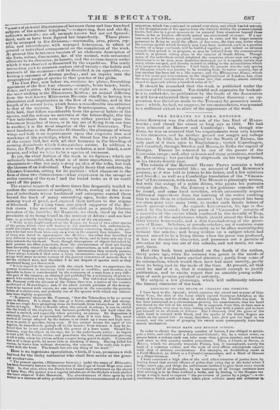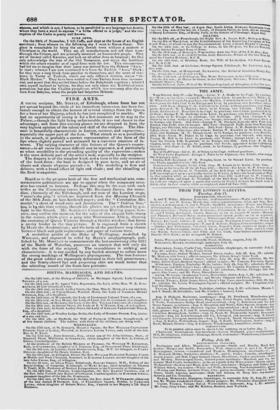THE REMAINS OF LORD ROYSTON.
Loan ROYSTON was the eldest son of the late Earl of HARD- WICKE ; and closed his career so long ago as 1808. He had been educated at Harrow and Cambridge; but, though stu- dious, he was so reserved that his acquirements were only known to his intimates, mid lie neither gained nor sought any college honours. In 1806, he left England for the North of Europe, the only part of it then open to Englishmen ; visited Copenhagen, and travelled, through Sweden and Russia, to Teflis the capital of Georgia. Thence lie returned by one of the passes of the Caucasian range; and, after sickness and ninny privations, reached St. Petersburg ; bet perished by shipwreck on his voyage home, in his twenty-fourth year. The volume of the Reverend HENRY PEPSIS contains a brief memoir of this uneventful life ; an account of Lord RoYsToN's journey, as it was told in letters to his hither, and a few relations and friends ; as well as a Cambridge translation of the " Cassan- dra"Of LYCOPHRON, with notes. The Memoir is pleasingly written, but with the eulogy of a polite divine, who paints his portraits without shadow. In the Journey a few judicious remarks will be found, and some local novelties, which occasionally acquire additional impoitatice from the learning of the writer enabling him to turn them to scholastic account : but the ground has been too often gone over since 1808, to render such family letters of inuch general value. As regards LYCOPHRON, his age is dis- puted by the learned ; but the poem of "Cassandra" consists of a narrative of the events which conduced to the downfal of Troy, a prophecy of the misfortunes which should attend the Greeks in their return homewards, and a dim foreshadowing of the great- ness of Rome. Scholars, or pseudo- scholars, say it contains some poetry : it contains so much obscurity as to be often unintelligible without the scholia; and being written on a subject which had almost ceased to be a living theme when the poem was produced, it has no distinctive chalacter, and possesses not a particle of attraction for any one out of the schools, and not much, we sus- pect, there.
Had this book been published on the death of the author, thirty years ago, when his memory was green in the minds of his friends, it would have excited attention ; partly from some of its information, which would then have had more novelty, partly from its being cast in the mode of the time. At present, all that need be said of it is, that it contains merit enough to justify publication, and to excite regret that an amiable young noble man of such promise perished so untimely. We subjoin a few gleanings, which will sufficiently ndicate the literary character of the book.
ARGUMENT ON THE DEATH OF CHARLES THE TWELFTH.
I have been to the Arsenal ; which contains the sword and armour of Gus- tavus 'Vasa, the skin of the horse which carried Gustavus Adolphus at the battle of Lutzen, and the clothes in which Charles the Twelfth was shot. It has been mentioned as a circumstance proving his assassination, that his hand was found on the hilt of his sword. He is supposed, from this, to have seen a person standing very near to him, taking aim at him with a pistol, and to have put himself in an attitude of defence. But 1 observed, that the glove of the tight hand is covered with blood, and the marks of the bloody fingers are visible on the sword-hilt : he must, therefore, have first put his hand to his wound, and the action of giaspiug his sword must consequently have been merely mechanical.
RUSSIAN RANK. AND RUSSIAN JUSTICE.
In order to obtain the necessary number of horses, I was obliged to andel-. pate a little, and call myself a Liemenant•Colonel ; for, by a receut order, no person below a certain rank can take more than a given number, and military rank alone in this country confers precedence. Thus, a Count, or Baron, ot Knot's, which we absurdly translate niece' has, if unemployed, merely the rank of a common soldier, and the scale of civil offices corresponds exactly with that of military commissions. For example, an Archbishop ranks as a Field-Marshal, an Abbot as a Colonel-Commandant, and a Maid of Honour
as a 51ajor•General. • • •
1 have conceived a high idea of the civil administration of justice here, by having found that several officers of police dine every day at the hotel where I lodge, never pay, and oblige the unfertunate landlord to give them every mouth a receipt in full of all demands; by this testimony of all foreign residents here that nothing is to be done without a bribe, and by firstling in the Russian Ian guage a single word to express " the per version of justice by a judgss,"—a cir- cumstance which could not have taken place without many runt tielmious Mance', and which is not, I believe, to be paralleled in any language bat Arabic, where they have a word to express "a bribe offered to a judge," and the cor- ruption of the Cadis is pretty well known.
PURE JEWS.
On the 24th of November, I left Cuffs, and slept at the house of an Englieh merchant; from whence on the following day I went to Kat:Is-Bazar. This place is remarkable for being the only Jewish town without a mixture ol Christians in the world. They are all manufacturers, and sell their ware. through the Crimea, and are generally esteemed an honourabie people. They are of thesect called Karaitea, and look on all other Jews as heretical ; for they only acknowledge the text of the Old Testament, and reject the tradition- which the others consider as of equal force with the law. This circumstance had led me to imagine that their name was derived from the Hebrew " karn," to read ; whereas I am now convinced it is from the Turkish " kera," black t for they wear a long black dress peculiar to themselves, and the name of their town in Tartar or Turkish, which are only different dialeets, means " the Black Market." They have been settled in Crim-Tartary (morn time iminemo rial, and assert that they settled there before the flabylonish captivity ; which I own myself inclined to believe, for they not only reject the Rabbinical inter- pretations, but also the Chaldee paraphrase, whirls was necessary after the re- turn from Babylon, when the people had forgotten Hebrew.



























 Previous page
Previous page